The business culture in Poland mixes old values with new practices. It’s shaped by Poland’s history and its role in the European Union. For those from abroad, knowing Polish corporate etiquette is key to making good partnerships and getting along at work.
This culture values building relationships, a clear hierarchy, and a way of talking that is both direct and respectful. It’s all about creating strong bonds and clear communication.
As businesses grow, understanding these cultural details is crucial. It helps in working well together in Poland’s fast-changing economy. Whether you’re new to the Polish market or looking to grow your business here, knowing the business culture is essential for success.
Introduction to Polish Business Culture

The Polish business scene is a mix of history and modern economy. It moved from communism to a market economy. This change has blended Western business ways with Polish traditions.
In Poland, personal relationships, trust, and honesty are key. Building strong professional ties is crucial. Networking is essential to succeed in Poland.
- Build trust before initiating business discussions.
- Attend social events to strengthen relationships.
- Invest time in understanding individual backgrounds.
To succeed in Poland, you must understand its culture. Knowing how to build professional relationships is vital. Without this knowledge, it’s hard to thrive in Poland’s business world.
The Importance of Networking in Poland
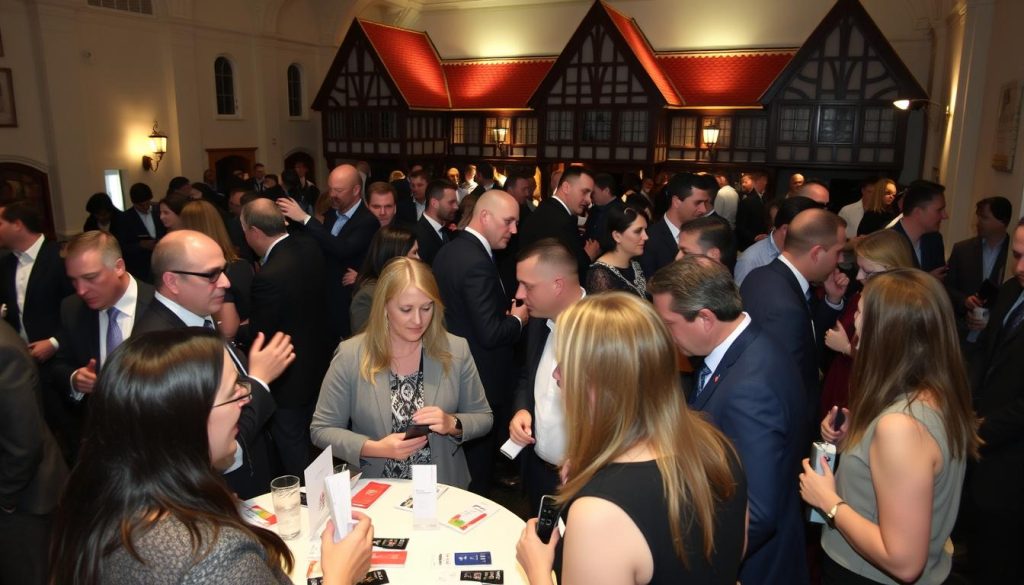
Networking in Poland is key for building and keeping professional ties. Here, making connections is more important than just doing business. Strong bonds help in successful talks and partnerships.
Building trust takes time. It shows you’re serious about working together well. This is important for understanding each other and working as a team.
Building Relationships
Building good professional relationships needs a personal touch. Face-to-face meetings are highly valued. They help people connect deeply and build trust.
Poles like to get to know someone’s character and intentions face-to-face. This is the start of a strong partnership. It helps businesses build a reliable network for long-term success.
Key Networking Events
There are many business networking events in Poland. The Economic Forum in Krynica and the Warsaw Business Expo are great examples. They bring together people from different fields.
These events are perfect for making new connections and finding new business chances. Being active in these events can make you more visible and strengthen your professional ties.
Cultural Hierarchy in the Workplace

The way workplaces are structured in Poland greatly affects how businesses are run. Polish organisations often have clear hierarchies, with each level having its own role. This setup means employees must respect their superiors and follow the rules set by management.
It’s crucial to understand these structures to move up in your career. This knowledge helps you navigate the work world better.
Understanding Authority Structures
In Polish workplaces, power lies with the higher-ups. They make the big decisions, and others follow their lead. This system makes work predictable and helps things run smoothly.
Knowing who has the power can improve teamwork. It makes working together more effective.
Interacting with Superiors
Talking to bosses in Poland needs to be formal. Being professional is key, using respectful language and titles. Employers value a respectful work environment.
Meetings and sharing opinions are done in a certain way. Poles tend to be reserved when disagreeing to keep things peaceful.
Communication Styles in Poland
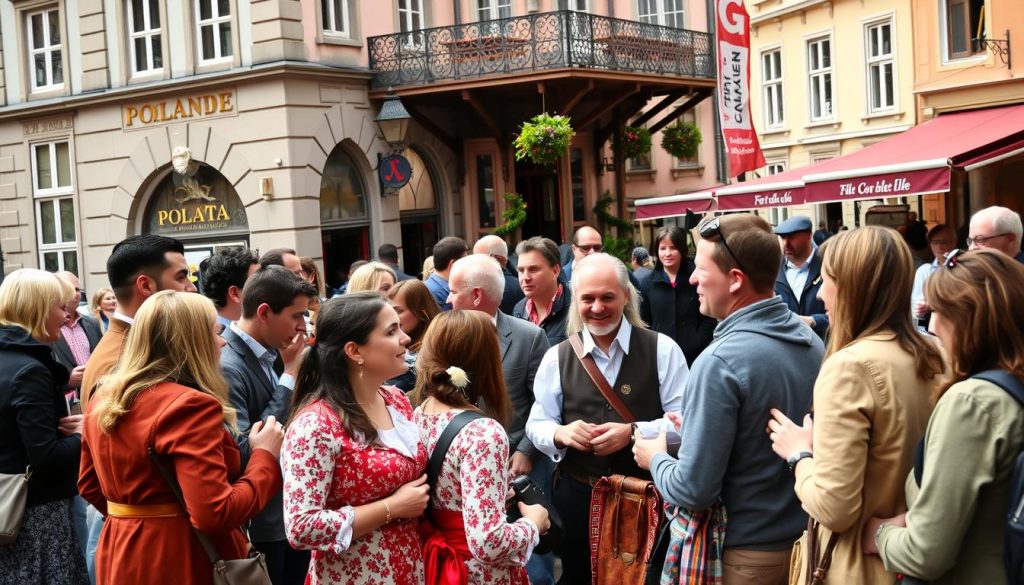
Understanding the communication style in Poland is key when doing business there. It greatly affects how well you interact and build relationships. Polish communication is often direct, valuing clarity and openness. This is especially true in work settings where being straightforward is appreciated.
Direct vs Indirect Communication
In Poland, direct communication is common, making talks clear and to the point. People usually share their thoughts openly and clearly state what they expect. This directness helps teams make quick, confident decisions.
However, when discussing sensitive topics, Polish communication might become more indirect. In such cases, people might choose to be more subtle to avoid conflict. It’s important to pay attention to body language and the situation to understand the message better.
Learning to adjust your communication style can improve teamwork and professional ties. Knowing when to be direct and when to be more careful is a valuable skill in the Polish business world.
Business Etiquette and Practices

Knowing how to conduct meetings is key for good business talks in Poland. It’s all about being professional and following certain rules. This helps keep the meeting productive and respectful.
Meeting Conduct
Meetings start with formal greetings, like a handshake. Being on time is very important. Showing up late is seen as rude.
When talking, keep it professional. Don’t interrupt others. This way, everyone can share their thoughts respectfully.
Presentation Norms
Presentations need to be clear and well-organised. They should be short and full of facts. Visual aids are a big plus, as they make the message stronger.
Using data to back up your points is good practice. Being ready shows you respect the time of others.
Business Culture in Poland

Understanding the business culture in Poland is key for success. Polish corporate values shape the workplace, mirroring the wider society.
Understanding Polish Corporate Values
Polish corporate values focus on diligence, commitment, and honesty. Professional integrity is highly valued, affecting how businesses deal with clients and partners. Polish companies value loyalty and long-term relationships, crucial for success.
Sticking to these values builds trust and teamwork among all involved.
Adaptations for Foreigners
Foreigners in Poland need to adapt to the culture. Building relationships takes time, so patience is important. Learning some Polish can show respect and improve connections.
Embracing Polish work ethics means being genuine with colleagues and clients. Understanding Polish culture can lead to strong professional ties.
Dress Code Expectations

Knowing the dress code in Poland is key for anyone in a professional setting. The country values formality and seriousness in business. This section looks at what’s expected in terms of business wear.
Professional Attire Guidelines
In Poland, business clothes are often formal. Men should wear well-fitted suits, ties, and polished shoes. Women can choose tailored dresses or trousers with smart blouses for a polished look. Here are some tips for choosing the right clothes for work:
- Choose neutral colours like black, navy, or grey for a professional look.
- Make sure your clothes are tailored and pressed to show you’re serious.
- Invest in quality, yet comfortable, formal shoes to complete your outfit.
Looking refined is crucial, as your clothes should match the business setting. Knowing these dress code rules in Poland can boost your professional image.
Work-Life Balance in Poland

In Poland, the idea of work-life balance is becoming more popular. The old way of working was all about long hours and little personal time. But now, there’s a big push to make sure employees are happy and healthy, especially after the pandemic.
Now, employers are offering flexible work options. This lets staff balance their work and personal life better. Surveys show people like being able to work from home, have flexible hours, and extra days off.
Companies are also working on respecting personal space. By doing this, they’re not just making employees happier. They’re also keeping them around longer and more engaged. This shows they care about a better work environment, just like the rest of the world.
Decision-Making Processes
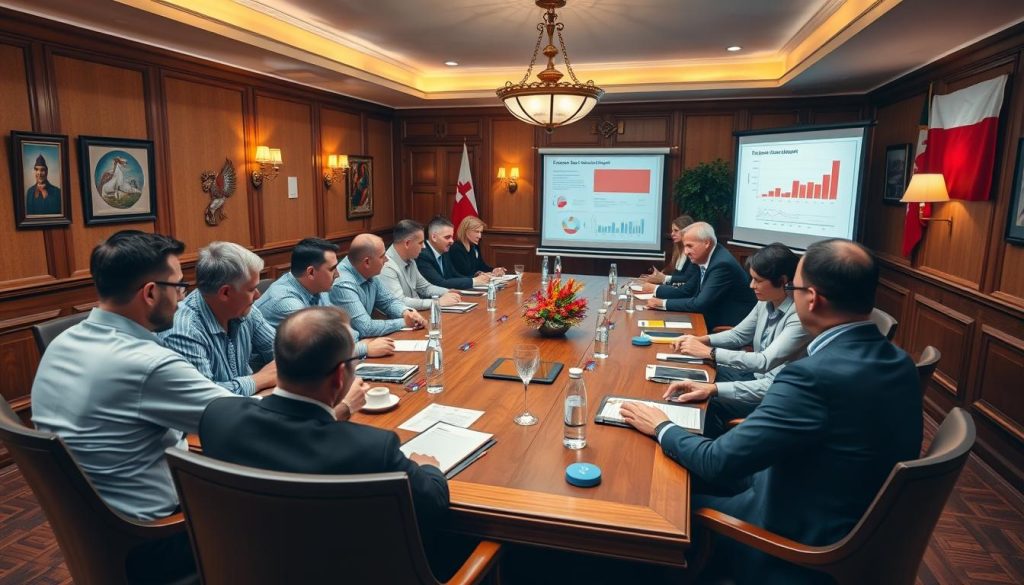
Understanding decision-making in Poland is key for success in business. It balances consensus and authority. Leaders involve their teams, creating a space for collaboration.
Consensus vs Authority
Decision-making in many firms combines consensus and authority. This method promotes open talks, letting everyone share their views. Even though top managers make the final call, consensus builds team spirit and loyalty.
Influence of Seniority
Seniority greatly affects decision-making in Poland. Experienced staff are highly valued for their insights. Younger workers seek guidance from their seniors, seeing them as experts in company matters.
Time Considerations in Polish Business
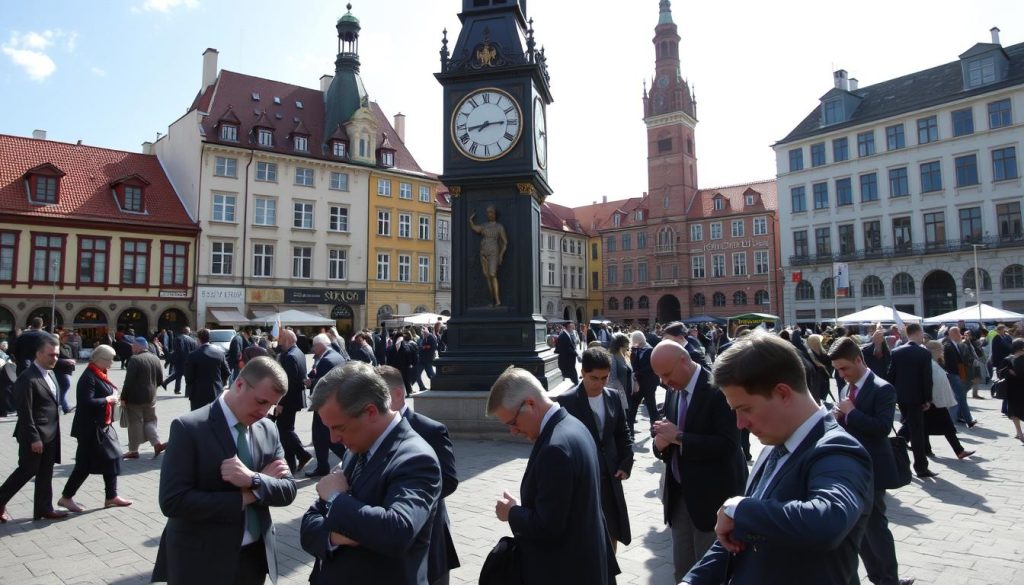
Punctuality is key in Polish business culture. People are expected to arrive on time for meetings. This shows they value time and respect others.
Being late can cause confusion and hurt your reputation. Polish businesses place great importance on keeping to schedules. This helps keep things running smoothly and efficiently.
Punctuality and Time Management
Punctuality in Poland is more than just showing up on time. It’s about showing respect and being professional. Good time management is vital for success in Polish business.
Polish companies stick to their schedules closely. This helps everyone stay focused and productive. For foreign professionals, understanding this is crucial for doing well in Poland.
Understanding Polish Holidays and Traditions

Knowing about Polish holidays is key in business. It helps in understanding local customs and building strong business ties. Major holidays like Christmas, Easter, and Independence Day are important. Each holiday has its own traditions that show the nation’s history and values.
Many businesses shut down on these big days, affecting work. For example, Christmas Eve, or Wigilia, is for family, and work stops early or all day. Easter and Independence Day also see less business, so it’s important for foreign companies to be aware.
Planning meetings around these holidays can cause problems. So, foreign businesses should learn about Polish holidays to succeed. Showing respect for these traditions helps build stronger relationships and shows you care about local customs.
International Business in Poland

Poland’s entry into the EU has made it more attractive for international business. It has built a strong infrastructure, drawing in foreign investment. This has opened up many opportunities for partnerships in Poland.
Key areas like technology, manufacturing, and services have grown a lot. Poland is now a key spot for businesses wanting to grow in central Europe.
Global Business Partnerships
Creating global business partnerships is key to success in Poland. Companies working with local firms find it easier to enter and grow. These partnerships bring benefits like access to local networks and understanding of consumer habits.
Companies that build strong local connections often grow faster and get a better market position.
Cultural Sensitivity
Cultural sensitivity is crucial for successful international business in Poland. Knowing local customs and business practices helps avoid misunderstandings. It also improves cooperation.
Being aware of cultural differences leads to better interactions and trust. This is vital for foreign investment success and building lasting partnerships in Poland. Respecting Polish traditions greatly improves the business experience.
Challenges for Foreign Businesses

Foreign companies aiming to set up in Poland face many hurdles. The Polish legal and regulatory systems are complex. It’s vital for businesses to do their homework before diving in.
Navigating Legal and Regulatory Frameworks
For foreign businesses, following local laws is key. This includes tax and employment rules specific to Poland. To overcome these challenges, companies should:
- Work with local lawyers who know Polish laws well.
- Get to grips with local tax laws and duties.
- Check employment laws to hire fairly and legally.
- Keep up with changes in laws that might impact their work.
By tackling these issues, foreign businesses can ease their way into the Polish market.
The Role of Technology in Polish Business

Technology has changed a lot in Polish business in recent years. Companies now see digital change as key to staying ahead globally. They focus on new tech to improve how they work and serve customers.
Embracing Digital Transformation
Polish businesses are using new tech to get better at what they do. This big change is more than a trend. It’s a major shift in how they run their operations.
- Improving communication channels through digital platforms.
- Utilising data analytics for informed decision-making.
- Implementing e-commerce solutions to expand market reach.
- Enhancing customer engagement through personalised services.
The tech sector is booming, showing Poland’s drive for innovation. This supports the use of new tech in old business ways. Tech in Polish business is linked to growth and staying strong, pushing firms to keep up with changes.
Corporate Social Responsibility in Poland
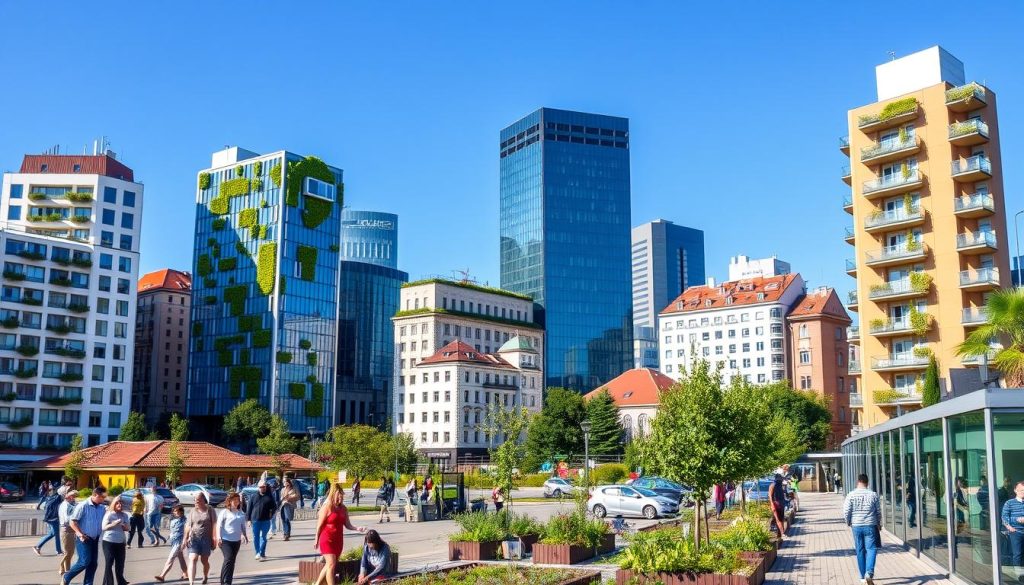
Corporate social responsibility (CSR) is becoming more popular in Poland. This shows a move towards more ethical business practices. Polish companies are now seeing the value of adding social good to their work, not just making profits.
This change is part of a bigger global trend. Consumers want brands to be sustainable and help society. They expect more from the companies they support.
Ethical Business Practices
In Poland, many businesses are focusing on being ethical. They care about the environment and helping their communities. Here are some ways they do this:
- They invest in green technologies and cut down on pollution.
- They help local areas through donations and volunteer work.
- They make sure their workplaces are fair and diverse.
These actions not only improve the company’s image. They also win the trust of customers who look for ethical brands. Poland is becoming a leader in responsible business in Europe.
Summary of Key Takeaways
Getting to know Poland’s business world is key for foreign companies wanting to thrive. Polish business culture values building strong relationships. This is the base for successful partnerships. Building trust and familiarity helps in working together better and makes talks smoother.
Polish culture also respects hierarchy at work. Who makes decisions is important. Knowing this helps in moving through company structures smoothly. It’s vital to understand how to talk to bosses to work well together and meet local standards.
Good communication is also crucial. Knowing how to communicate directly and indirectly helps avoid mistakes. By focusing on building relationships, respecting hierarchy, and communicating well, foreign businesses can do well in Poland’s competitive market.

